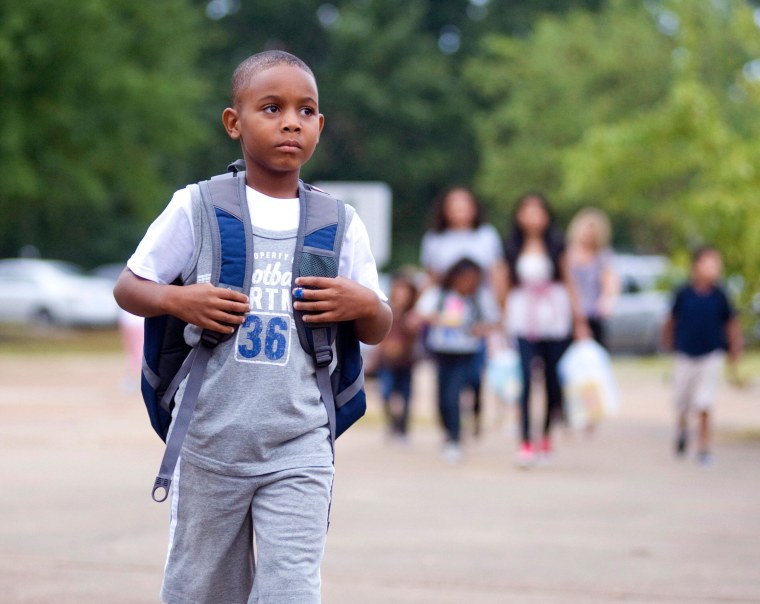Ed. note: One of our new features, which we started last week, is our "And another thing..." posts from our guests. Since there's never enough time in a segment to hit all of the points, each one of these posts will follow up a conversation Melissa had with them in an earlier show.
This week's edition is a timely one, given President Obama's recent re-emphasis on education policy (see his new ad here), and what challenger Mitt Romney had to say last week (see the top of our discussion, embedded below). Below is a follow-up on that discussion from our guest Lila Leff, education reform advocate, co-chair of the Chicago Consortium on School Research, and founder of the UMOJA Student Development Corporation.
Don’t we need to start by agreeing on the purpose of an education, and the elements of an effective one, before we can determine how we measure the success of students and teachers? I would like to think we can find something true but decidedly uncontroversial, something that forges a path through the polarities. How about saying that the goal of education is to prepare citizens to engage in our democracy as self-sustaining members of society? Can we also then acknowledge that our educational system is currently tasked with a more complex job than ever before in the history of public education? Teachers, schools and districts are being asked to prepare students for a whirling world of change; jobs that don’t yet exist and an economy where educational attainment is necessary but not sufficient.
And, if we find ourselves on the stable ground of agreement so far, let’s just examine one more premise: Are there really any among us who don’t agree that student and teacher performance matter and need to be measured?
The conversation on testing is one that seems to take place most often in the land of extremes or generalities -- “No, we shouldn’t” and “Yes, we should.” Let me give you a brief summary: No Child Left Behind (NLCB) said we need to get clear about what teachers are teaching and students are really learning and how well they are learning it. NLCB determined that the best way to do that would be by asking states to make up their own high stakes tests and then tell the rest of us if they are doing well or poorly. If the states were crazy enough to make up tests where their students did not appear to be doing better than they actually were, then the next step was to punish those states, districts, schools and teachers for not doing well enough.
The intervention strategy was simple and straightforward: states will do better because we will punish them for doing badly. This will encourage them to improve -- or least they will be encouraged to look at states who have figured out how to make easier tests so their students show improvement. Thing is, dysfunctional systems or people rarely get punished into improvement. As a general rule, we don’t see real and lasting improvements until we get under the rock, poke around, figure out what’s really going on and how to build supports, skills, incentives and consequences that concretely address the issues that have led to dysfunction and failure in the first place.
As more states accept the Common Core Standards and move toward designing tests to measure universally agreed upon academic standards, questions remain. The right question is not should we have tests, or shouldn’t we. The right questions are more textured and nuanced. Examples:
- What is a financially reasonable way of meaningfully measuring and reporting on student learning?
- How do we ensure that we are measuring meaningful things that can be impacted by good teaching and that ultimately matter for students’ lifetime success?
Let’s be clear: many of us do not agree that all tests are created equally. Furthermore, we don’t all agree that high-stakes standardized testing is either the cheapest or the most objective way to measure student learning. Good tests (or assessments) measure learning, not simply to punish or reward those who have or haven’t learned, but rather as part of an information loop that allows for reflection, redirection, re-teaching and strategic forward movement based on real-time and instructive data. Real life, which place education is designed to get us ready for, requires that adults take content knowledge and skills and apply them to a variety of very different contexts. Students need the opportunity to apply their skills, their knowledge, and their creativity to new and real life situations.
If we are to produce students who are ready to enter our democracy as global citizens, they must spend time writing, communicating, developing original thought and collaborating with their peers. If we are to successfully prepare the next generation to enter the fast-paced ever changing job market of the future, they must receive meaningful and regular feedback on their growth as navigators of a complex world. We cannot get there by testing alone and the fact that we continue to try to speaks, in large part, to our unwillingness as a society to reinvent education based on the needs and opportunities of the world in which it currently exists.
You can view our entire education discussion below, and after the jump. You may want to also check out Mother Jones' encouraging look at a "low-performing" school, published today.
